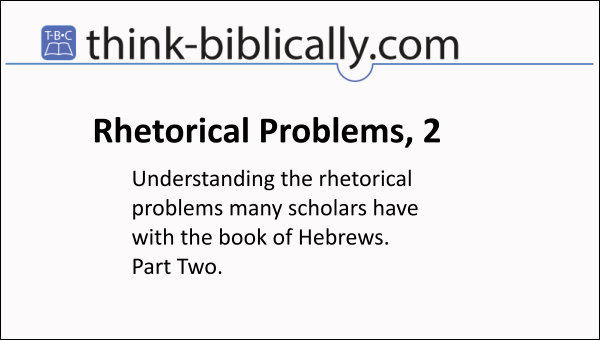By Tyson Thorne

The author of Hebrews begins by arguing for the superiority of Christ. His argument comes to complete fruition in showing the superiority of the Melchizedekian priesthood over the Levitical. From 4.14-8.13 the argument shows how the Levitical priesthood and old covenant are to be replaced by a new and improved priesthood and covenant. After painstakingly proving that Jesus Christ, our Savior, is also the expected king, the author desires to prove that He is also our High Priest. Jesus’ lineage proved He was an heir to David’s throne, the quoted enthronement psalms reveal His Messiahship, but how can the believer be justified if there is no high priest to intercede?
For starters, the author explains, Jesus is all that a High Priest is to be. The office belongs to one who is called of God (5.1-.6), able to identify with sinners (5.2-.3) and is to show grace and mercy to the suffering (4.15-.16). Jesus meets all of these requirements. Of course, there is one requirement any good Jew would point out: to be a high priest he must be from the tribe of Levi. God established the Levitical priesthood with Aaron in Exodus 28; the Levites were set apart for God’s service to offer sacrifices. Since Jesus was not of this tribe, how could he be our high priest?
In Chapter seven the author introduces a new player in the priesthood argument: Melchizedek. In all of Scripture, Melchizedek is mentioned only three times: there is a brief meeting between Melchizedek and Abraham in Genesis 14; Psalm 110 states the Messiah will be of the order of Melchizedek; and here, in the book of Hebrews, he appears one last time. Melchizedek, though a Gentile, was a servant of YHWH, a priest, and a king. Though Jews would not have allowed such dual office holding, he was highly honored by Abraham. Abraham was considered greater than Levi, because he was the “father” of Levi. Because Abraham paid a tithe to Melchizedek, he was seen to be inferior to Melchizedek. All this is told to prove Melchizedek’s superiority to the Levitical priesthood. But what has this to do with Christ?
If the Levitical priesthood could attain perfection for mankind, then there would be no need of a priest from the order of Melchizedek as Psalm 110 prophesies. It is precisely because the Levitical priesthood could not attain perfection that the new was instituted, and along with the new priest came a new covenant – a covenant with power to save.
Hence, the author proves the Melchizedekian priesthood is better because it is eternal, is instituted by an oath (7.20-.21), is founded by someone greater, and because it is accompanied by a covenant with the power to save.
In chapter eleven the author turns to a more practical discussion, one which describes Christianity in action. In chapter 11, the author argues that Christianity is faith in God, that is, in His accomplishments on the cross, the power of His resurrection, and His promise of eternal life. In chapter twelve, he describes Christianity as faith that God will provide the best for you, even if you do not understand how the trails are for your benefit. Toward the end of chapter 12 and the first half of chapter 13 he shows that Christianity is faith in God’s leadership, and in His leaders.
The warning in chapter 12 provides us with a strong contextual argument. Evidently, instead of remaining firm in the faith, many were leaving the cross behind and returning to Judaism. By doing so, they proved themselves to be no better than their forefathers who, rather than trusting God, desired to return to Egypt. The forefathers fell in the desert, and now, the nation of Israel would fall away again. The path of the believer leads to enlightenment, then salvation, growth, and finally to eternity in the presence of He who Saves. But these apostates turned away before ever receiving the enlightenment which leads to salvation. Apparently, the author believed that all who were going to leave Christ had done so, for he encouraged them saying, “I am confident of better things in your case.”
Although the problem of Jewish persecutions and the danger of Jewish Christians leaving Christ to return to their former way of life is not conclusively the rhetorical problem, the cultural and contextual arguments are strong.
